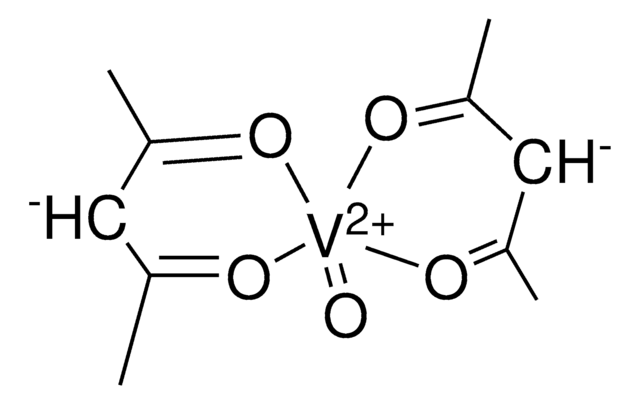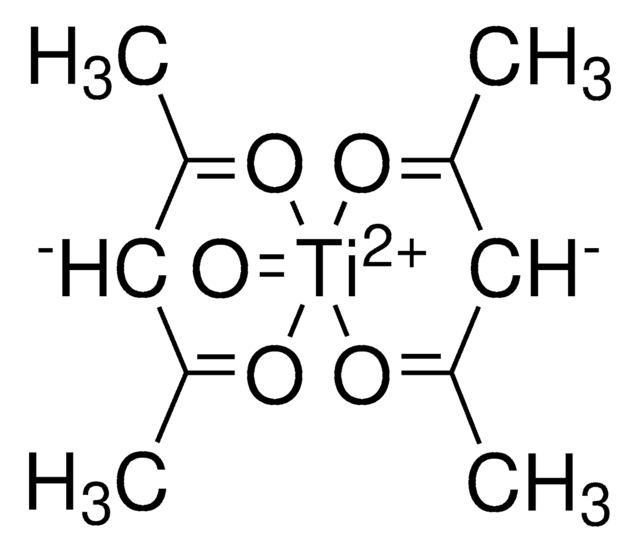338001
Zirconium(IV) acetylacetonate
97%
Synonym(s):
2,4-Pentanedione zirconium(IV) derivative, Tetrakis(2,4-pentanedionato)zirconium(IV), Zirconium(IV) 2,4-pentanedionate
About This Item
Recommended Products
Assay
97%
form
powder
reaction suitability
core: zirconium
reagent type: catalyst
SMILES string
CC(=O)\C=C(\C)O[Zr](O\C(C)=C/C(C)=O)(O\C(C)=C/C(C)=O)O\C(C)=C/C(C)=O
InChI
1S/4C5H8O2.Zr/c4*1-4(6)3-5(2)7;/h4*3,6H,1-2H3;/q;;;;+4/p-4/b4*4-3-;
InChI key
FPFOSIXCIBGKOH-MTOQALJVSA-J
Looking for similar products? Visit Product Comparison Guide
1 of 4
This Item | GF11838809 | GF39839844 | GF03787746 |
|---|---|---|---|
| assay 99% | assay 99% | assay 99% | assay 99.95% |
| manufacturer/tradename Goodfellow 157-077-29 | manufacturer/tradename Goodfellow 118-388-09 | manufacturer/tradename Goodfellow 398-398-44 | manufacturer/tradename Goodfellow 037-877-46 |
| mp 1453 °C (lit.) | mp 1453 °C (lit.) | mp 1453 °C (lit.) | mp 1453 °C (lit.) |
| resistivity 6.97 μΩ-cm, 20°C | resistivity 6.97 μΩ-cm, 20°C | resistivity 6.97 μΩ-cm, 20°C | resistivity 6.97 μΩ-cm, 20°C |
| bp 2732 °C (lit.) | bp 2732 °C (lit.) | bp 2732 °C (lit.) | bp 2732 °C (lit.) |
General description
Application
- As a sol-gel precursor to synthesize zirconia nanoparticles with photocatalytic activity.[1]
- As an additive to improve the performance of the electron transport layer in perovskite solar cells.[2]
- To synthesize as-prepared zirconium acetylacetonate (a-ZrAcac) film as a cathode buffer layer in polymer solar cells. It exhibited an average power conversion efficiency (PCE) of 8.75% which is significantly improved than that of the devices with traditional Ca/Al cathode.[3]
- To synthesize high-κ zirconium oxide gate dielectric for Organic Field-Effect Transistors at low voltage operation.[4]
- To fabricate the conductive interlayers for quantum dot light-emitting devices(QLEDs), which enhances quantum efficiency, power efficiency, and longer operational lifetimes.[5]
- As a ring-opening initiator to synthesize biodegradable polyacids.[6]
- As a catalyst to synthesize polylactide terpolymers.[7]
Signal Word
Danger
Hazard Statements
Precautionary Statements
Hazard Classifications
Acute Tox. 4 Oral - Flam. Sol. 1
Storage Class Code
4.1B - Flammable solid hazardous materials
WGK
WGK 3
Flash Point(F)
Not applicable
Flash Point(C)
Not applicable
Personal Protective Equipment
Choose from one of the most recent versions:
Already Own This Product?
Find documentation for the products that you have recently purchased in the Document Library.
Customers Also Viewed
Our team of scientists has experience in all areas of research including Life Science, Material Science, Chemical Synthesis, Chromatography, Analytical and many others.
Contact Technical Service
















